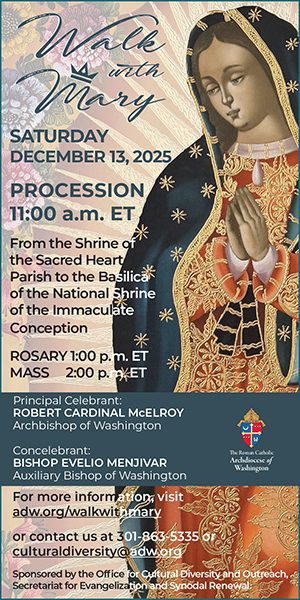The U.S. minimum wage is set at $7.25 per hour – less than $15,000 per year for a full-time worker. It’s no wonder so many Americans (more than three million in 2018, according to the Bureau of Labor Statistics) work full-time, yet live in poverty.
Happily, that’s not the case in Washington, D.C. Thanks to a strong campaign by D.C. workers, unions and community groups, the City Council has exercised its right to legislate a higher minimum wage in the District. On July 1, the minimum wage in Washington, D.C. increased to $15 per hour, or about $30,000 per year for a full-time worker. (Some workers, such as waiters and bartenders, are only guaranteed a $5 per hour wage, on the assumption that tips will make up the difference.)
This Labor Day weekend is the perfect occasion for members of our Catholic parishes in the Washington area to reflect on the importance of this increased minimum wage. A surprising number of workers don’t realize they are entitled to this. The other day, visiting a construction site in the District, I spoke with a laborer on his lunch break and he told me that he was making $13 per hour. A recent immigrant from Honduras, he had no idea that the law in Washington required his employer to pay him $15 – a difference that would cost him more than $4,000 over the course of a year!
There’s another good reason why priests might take the time to talk about the minimum wage with their congregations this Labor Day weekend. The minimum wage – especially in the United States – has Catholic fingerprints all over it.

From Rerum Novarum to the Fair Labor Standards Act
The roots of the minimum wage law can be found in the foundational document of Catholic social teaching: Pope Leo XIII’s encyclical Letter Rerum Novarum (1891). In the letter, the Holy Father looked out at the industrial revolution happening around him and saw the world separating into two classes – rich owners of industry and impoverished workers. He argued that every worker deserved a living wage, capable of supporting himself and his family, and that if the labor market did not provide this, society must intervene.
One person excited by Rerum Novarum was the future Msgr. John Ryan in Minnesota, who was ordained in 1898. Ryan combined the theology of Rerum Novarum and exhaustive sociological research in his doctoral dissertation, later published in book form as A Living Wage. Reformers in different states cited his work as they implemented state minimum wage laws for the first time.
Msgr. Ryan himself went on to serve as the first social action director for the National Catholic Welfare Conference, the forerunner of the U.S. Conference of Catholic Bishops (USCCB). In this role he lobbied for Christian principles of political economy such as a national minimum wage and the right of workers to organize in labor unions (another element found in Rerum Novarum). In 1938, when President Franklin Delano Roosevelt and his New Dealers controlled strong majorities in the government, they passed the Fair Labor Standards Act, which established our national minimum wage.
The fight for a minimum wage is not over, however. Over time, inflation erodes the value of the minimum wage, but business owners fight fiercely whenever legislators try to increase it. That’s how we wound up with a national minimum wage set at $7.25 today – clearly not a family-supporting living wage anywhere in the country. While the “fight for $15” has been won in the District, and the U.S. Conference of Catholic Bishops has persistently lobbied for an increase in the national minimum wage, it remains an uphill battle.
Family leave takes flight in District
Another major innovation took effect on July 1 in the District: Paid Family Leave. While most salaried, management employees enjoy paid sick leave and family leave benefits, most hourly workers do not. Across the country state Catholic conferences have been lobbying for legislation that would guarantee workers paid time off to bond with a new child or to care for a sick family member (or simply to take care of oneself when sick, instead of coming to work and infecting others). After all, if we want to strengthen families, it’s critical to make sure that family needs are protected from excessive workplace demands.
Last year on (July 1, 2019) the District government took this step and began collecting a payroll tax of 0.62% of wages to administer a paid leave program. The District set up an Office of Paid Family Leave in the Department of Employment Services (DOES) and began banking the funds to pay the benefit. Starting July 1, 2020, workers can apply for the benefit, taking up to eight weeks of paid leave with their new baby, six weeks to nurse an ill family member, or two weeks for their own health problem. (The benefit may vary depending on how long one has been working and contributing to the fund.)
As a new program, there’s even less awareness of paid family leave than of the minimum wage. This Labor Day weekend offers an opportunity for parishioners to learn about and appreciate the importance of paid family leave, which also reflects Catholic social teaching about the dignity of life and work.
(Clayton Sinyai is executive director of the Catholic Labor Network, an Association of the Faithful based in the Archdiocese of Washington and a national Catholic Campaign for Human Development grant recipient. He can be reached at clayton@catholiclabor.org.)












